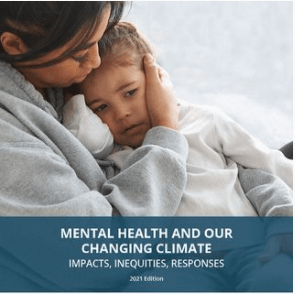Natural Connections: Collaboration with the Environment
This post is part of a Mental Health Awareness Month blog series that highlights “Closer Look” perspectives from the 2021 edition of Mental Health and Our Changing Climate. This is a reprint from the report.
Natural Connections: Collaboration with the Environment
I have worked as a clinical social worker for over 20 years in Anishinaabe and rural communities throughout Minnesota, and I have seen firsthand the impacts of climate change on mental health. I am not alone. In 2019, I worked with the Minnesota Department of Health on a survey examining mental health professionals’ knowledge, attitudes, and practices associated with climate change. We found over 61% (n=500) of the respondents were seeing client symptoms associated with climate change. Unfortunately, only 10% felt adequately equipped to address the concerns. Thus, most of my work as a practitioner/educator has been focused on how to mend personal/planetary relationships that foster wellness.
Through Elders’ teachings and varied experiences with Tribal, non-profit, state, and county entities, I have learned that health and community wellness must expand beyond the medical model and include relationships with all that lives: the rooted, four-legged, swimmers, crawlers, fliers, Aki–Earth, and Nibi-water. Interdisciplinary connections are a given in addressing health. What is often overlooked is collaboration with the natural world in the healing process.
Based on wisdom from Anishinaabe Elders and Western Ways of knowing, I mentor the next generation of mental health professionals on how to work with behavioral health responses associated with our changing planet. I train students to remember who they are in relation to the land and how to access the natural world as an active partner in the healing process. Students learn to assess and regulate their own nervous systems in relationship with the natural world so they can remain actively engaged at micro (personal, family), mezzo (social, organizational), and macro (Tribal, federal) level systems work.
At the micro level, students learn somatic literacy skills to address primary and secondary trauma responses, which include observing, listening to, and trusting the innate rhythms of the body. Students also practice connecting with the natural world — the collective nervous system — through purposeful engagement and sensory awareness. Somatic literacy helps those incapacitated by solastalgia, eco-anxiety, or environmental grief, move from flight and freeze responses to healthy fight responses and social engagement. Ultimately, the goal is to practice assessment and intervention through the lens of planetary health, recognizing that human behavior impacts the world. By tending to personal dis-ease and restoring natural connections with the environment, we spark communal prosocial behaviors toward our planetary relatives. The hope is collaboration with the natural world will ripple to embodied personal and planetary healing.
Read the report, HERE. And share on Social!
About ecoAmerica
ecoAmerica builds institutional leadership, public support, and political resolve for climate solutions in the United States. We help national mainstream organizations elevate their climate leadership, providing them strategy, tools and resources to: demonstrate visible climate leadership, empower climate literacy, engage all constituents, and build collective action and advocacy. We help our partners transform into national climate leaders who inspire others on solutions. ecoAmerica.org
Want the convenience of getting ecoAmerica’s newsletter and blog in your inbox? Subscribe today!
Join ecoAmerica in the call for more ambitious and just climate action. Sign the MomentUs statement today.
